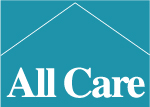February is Healthy Heart month and All Care is pleased to publish a 4-part blog series about heart disease, its effects, warning signs, and how to incorporate healthy habits to increase the health of your heart.
Part 3: Healthy Heart Eating Habits
Heart-healthy eating is not just about cutting back, it’s about making the right choices. Most people need to add more fruits and veggies to their diet which not only help to prevent heart disease but also may prevent cancer and improve diabetes.
While deciding on meals, remember that you want to limit the amount of fats in your diet, saturated and trans fat should be limited and avoided. Try to keep saturated fat to no more than 10% of your daily calories and try to keep trans fat out of your diet all together.
Major sources of saturated fat:
- Red Meat
- Dairy products
- Coconut & palm oil
Sources of trans fat include:
- Deep-fried fast foods
- Bakery products
- Packaged snack foods
- Margarines
- Crackers
Hint: If the nutrition has the term “partially hydrogenate,” it means the product contains trans fat
Fruits, vegetables, and whole grains help to protect your heart; beans, low-fat sources of protein, and certain types of fish can also reduce your risk of heart disease. Eating several servings a week of fish like salmon or mackerel may decrease your risk of a heart attack.
You also want to be sure to avoid foods high in sodium, here are 4 steps to reduce your sodium intake:
- Stop adding salt to your food
- Avoid processed and pre-made foods
- Eat fresh fruits, vegetables, meats, and grains
- Learn to read food labels
Eating a heart healthy diet also means keeping a close eye on the amount of alcohol you consume. If you choose to drink alcohol, it’s better for your heart to do so in moderation. For healthy adults, that means up to one drink a day for women of all ages and men older than age 65 and up to two drinks a day for men aged 65 and younger. At a moderate level, alcohol can actually have a protective effect on your heart however more than that can become a health hazard.
